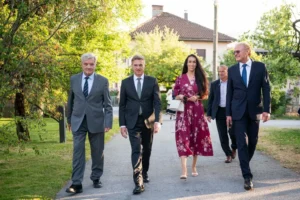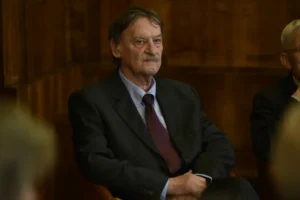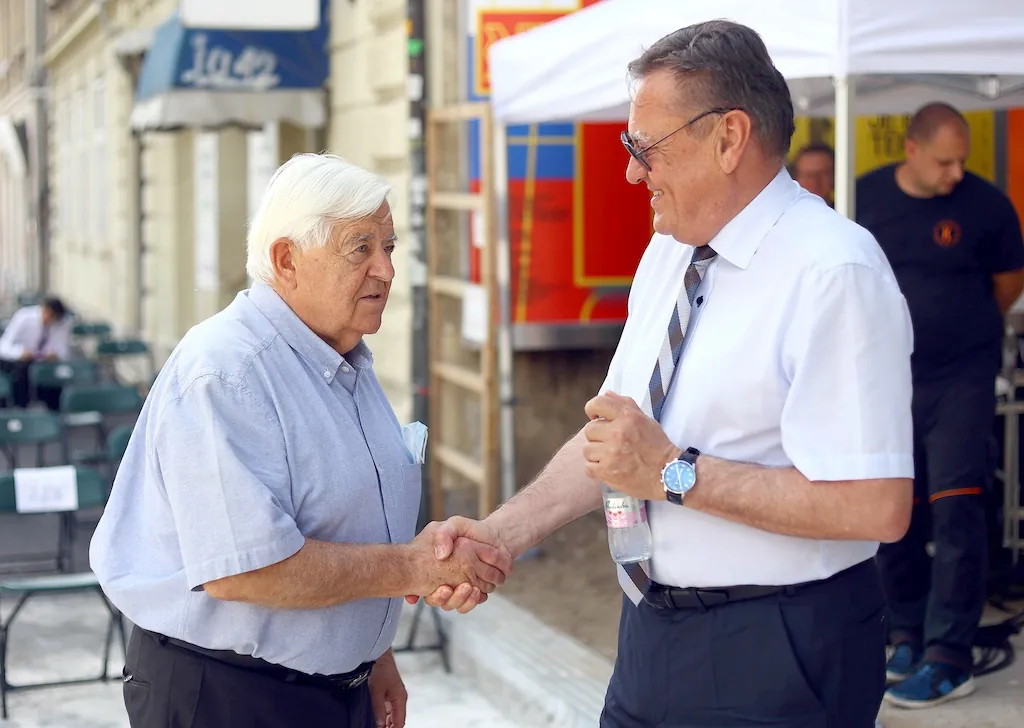On the 34th anniversary of its independence and statehood, can Slovenia even think about a “success story” anymore? 35 years after the first democratic elections, it seems as if we are ashamed of the changes we achieved during the Slovenian Spring.
But one thing is true: the godfathers from the background are, at least for the time being, still betting on Robert Golob, in a way responding positively to Žiga Turk‘s criticism at the presentation of the “Consensus for a Historical Moment” collection of essays, when he pointed out that the “new faces”, as soon as they became “old” ones, escaped responsibility, as the godfathers sent new and new ones into the campaign again. And we may be repeating the lesson of 2004, when Anton Rop, Gregor Golobič and others defended their rule in a brutal way, while Slavoj Žižek announced shortly before the elections that three minutes of a good film meant more to him than the fate of Slovenia.
Golob has retained Kučan’s support
The fact that Robert Golob has at least temporarily won the battle against his “new faces” rivals became clear last week – namely, on Wednesday, the18th of June. He was the guest of the evening at Škrabec’s homestead in Hrovača pri Ribnici. A bold act, because this event happened shortly after the local mayor, Samo Pogorelc, was physically attacked by a trio of Roma people and the criticism of the government by the local population was greatly intensified, because it is clearly playing the role of a paper lion and creating an appearance of security that is not really there. This is nothing new, it has already happened in the case of illegal migrants. The minister in charge, Boštjan Poklukar, who, according to some people, is a former cook in the Yugoslav People’s Party, stepped into the ministerial role for the second time after Golob got rid of Tatjana Bobnar, who comes from a circle close to Milan Kučan, which is why the President of the Republic, Nataša Pirc Musar, took her into her office. At that time, it seemed that relations between Kučan and Golob were severely damaged and that early elections could be called. However, this did not happen. Thus, after his election as Member of the European Parliament last year, Vladimir Prebilič was already looking forward to being the next “Messiah” and even expressed his belief that he was waiting for a “green light” from Kučan. But for now, it seems more likely that his fate will be similar to that of Igor Šoltes, the grandson of Edvard Kardelj, who, with the help of the I Believe party (Verjamem), made it to a seat in the European Parliament, but ultimately failed as State Secretary at the Ministry of Justice, a post from which he was dismissed by Golob’s government.
Did Janković play the leading role?
All this, however, is not yet proof that the godfathers will bet on Golob in the next elections. But there are indications that Golob will retain his support, thanks mainly to Zoran Janković, who everyone now knows is the real boss of Golob’s coalition. There are even suggestions that Janković has stepped up his role and even outplayed Kučan. Janez Škrabec, the formerly prominent face of Kučan’s Forum 21, also joined in on the action, inviting Golob to the aforementioned event and even promoting his appearance with a sweet note, which was sent to the media before the event. “It’s nice to listen to him. His trademark, which delights the general commentariat, is the coastal “g”, suspiciously similar to an “h”. He brought it from his native Goriška, where in his youth, he used to tame the rapids of the Soča River in his kayak. /…/ He was already in a hurry when he was in primary school, where he skipped the fourth grade, and at the age of 27, he obtained a PhD in electrical engineering with a Fulbright scholarship to specialise in the USA. He also rose meteorically to the mandate brought by the record electoral victory of his party, the Freedom Movement (Gibanje Svoboda). He came into the Prime Minister’s office at the moment of the collapse of the European energy supply as a top manager with a decade and a half of experience as Chairman of the Board of the energy company GEN-I. His temperamental performance heralded a dynamic man of action. In this efficient style, he then took on the biggest test – the floods in the summer of 2023, tackling the rising prices and the energy crisis. He had already developed perseverance and diplomatic skills as head of Slovenia’s energy negotiating team when joining the European Union. Years in the cabinet team added to his cosmopolitan prime ministerial posture and shortened his haircut. But his reason for being involved in politics remains the same as when he was a municipal councillor in Nova Gorica: ‘If you live in a community, you cannot act as if you don’t care what happens outside the borders of your home. You have to contribute to the common good, if not for your own sake, then for the sake of your children.'”

Škrabec as Kučan’s messenger
Of course, they forgot to mention that in Slovenia, despite having a top manager, we pay one of the highest electricity prices in Europe, that we had one of the highest inflation rates after Golob took office, and that even in the two years after the floods, the state has not built a single house for those whose homes were swept away by the floods. Škrabec’s company, Riko, has in the past participated in several state projects, particularly in the fields of energy efficiency, renewable energy and infrastructure, which in itself raises the issue of conflict of interest. The interview with Golob was moderated by Marjan Dora of IDEA TV and was also to be broadcast on his show. He is a long-time correspondent of the national media outlet, Radio-Television Slovenia (RTVS) from Murska Sobota and former long-time editor of Murski val. Almost ten years ago, Dora hosted Janez Škrabec on Murski val, where the latter said some meaningful words: “If Kučan had a party, I would vote for it. Now I voted for Ljudmila Novak, who ran in Ribnica, and for her party’s programme.” That was in December 2015, and a week after Škrabec, Milan Kučan was also a guest on the show. Apparently, by hosting Golob at Škrabec’s homestead, Kučan agreed to Golob going to the elections with the support of the godfathers, counting on a strengthened Left party (Levica), which has merged with Vesna – the Green Party (the party on whose list Prebilič stood in the European elections, but who did not want to become a party member), and perhaps also with the support of the so-called Third Bloc, where a “marriage” between Logar’s Democrats and the Concrete party (Konkretno), which is the former Modern Centre Party (Stranka modernega centra – SMC) is being predicted.
Hribar’s cover-up of independence
What is worrying is the fact that the whole thing has dragged on for far too long and that this state of affairs is driving many citizens to despair. It is a psychological game played by the transitional left to lull the spring party voters to sleep. That is why, through the dominant media, it is trying to sully the so-called merits of independence, which is supposed to be nothing more than a reminder of the old days and a kind of ‘opium for the people’, to use the well-known words of Karl Marx. And it is no surprise that the transitional left is also trying to either bend what is left of independence to its own interests or simply to the people’s interests. For this reason, for example, they have recently sent the Hribar spouses, Tine and Spomenka, into action. This is interesting mainly because Hribar is now trying to retrospectively adapt his story of how the independence steps were taken. “Tine Hribar has been lying about his role in independence for decades. I have repeatedly rebutted him, especially about Poljčane and the plebiscite. The peculiarity of his lying is that he lies again and again on the same issue – but each time in a different way,” Jambrek was critical in his response to the Nedelo interview. Thus, with regard to the events in Poljčane in November 1990, where the decision on the plebiscite was taken, Jambrek strongly “cleaned up” Hribar’s version, who is now claiming that he had convinced Bučar and Janša to go for the plebiscite before the consultation. “I myself believe that Hribar’s intention was to prevent the plebiscite proposal right before it was about to happen.” This is nothing new, because in 2007 already, when Rosvita Pesek presented her book The Independence of Slovenia (Osamosvojitev Slovenije), some other actors also opposed Hribar’s claims about the constitution, the plebiscite and other important actions. Like Jambrek, Hribar did not have a formal political role at the time, but it is clear that in 2004, he did not join the Assembly for the Republic, of which Peter Jambrek was the first president, by pure coincidence.

A so-called reset is on the horizon
The main message of all this is that independence is not yet a thing of the past, and its value is far from being an exhausted epochal event. It is still the starting point and the direction of Slovenia. This is also because the nation has not yet assumed the full role of sovereignty in its own country, as the 1989 May Declaration implied with its fundamental demand (“a sovereign state of the Slovenian nation”). Therefore, the launch of the new contributions to the national programme at the same time as the version of the new May Declaration recently presented by Vili Kovačič could mark a new and important beginning for the “resetting” of the Slovenian state.
Gašper Blažič


